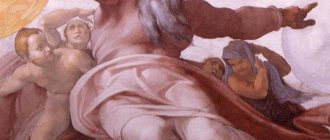Stages of falling away from God. Part 2. Mentalization and delusion
Author's column of the head of the department of theology of the Moscow Theological Academy, Archpriest Pavel Velikanov “Thoughts on faith”
The Tsargrad TV channel continues to publish on the pages of its website a series of theological articles by Archpriest Pavel Velikanov, united under the author’s heading “Thoughts on Faith.” The author continues a series of reflections on the stages of apostasy—a person’s falling away from God.
* * *
The second degree of decline, formed together with the first, sometimes as a consequence, and sometimes as a cause, is the numbing of thoughts. Saint Theophan the Recluse notes that the first two degrees are “mutually productive and mutually supportive. Subjugation by thoughts must be understood as it is presented by Solomon in Ecclesiastes - as surrendering oneself to concerns about earthly goods, which, however, do not give well-being, but only beckon them to themselves, always deceiving all hopes. Having turned away from God, they turn to creatures, and in them they want to find what the one God can give, they want to establish their well-being without God, on their own and with their own means at their disposal. All the concern is about this, all the thoughts, all the plans and all the goals of life are here - that is, how to arrange earthly happiness, enjoying sensual benefits”[1].
Unlike the previous stage—forgetfulness of God—where a certain interest in matters of piety was still retained, but was gradually pushed to the periphery of life, during disillusionment the attitude towards God is observed only outwardly, according to a once established ritual or custom. Here there is no longer only a heart, but also a thought:
Everything became earth, earth, earth. And that doesn’t make it clear that deception is constantly being experienced. The fussiness continues tirelessly in the vain hope that perhaps we will still get what we are looking for. How can such a course of action be excused?![2]
Saint Theophan also quotes the words of the Old Testament prophet Jeremiah: “My people have committed two evils: they have forsaken me the fountain of living waters, and dug up for themselves treasures of broken things (Jer. 2:13).”
Saint Theophan the Recluse. Photo: pravoslavie.ru
Man, having denied God a central place and meaning in his life, begins to gradually push Him aside. Although there has not yet been an outright and daring fall from grace, external customs remain unchanged, but the heart is already captivated by completely different, non-Divine and non-spiritual things. The desire for happiness becomes primary, and a person makes a big mistake: by preferring a “bird in the hand” to a “pie in the sky,” he both loses the crane and does not receive the tit.
This is well said in one of the Savior’s agraphs:
Ask for great things, and little things will be given to you; ask for heavenly things and earthly things will be given to you
(Clement of Alexandria) - to achieve less, you need to set the goal much further.
An inevitable consequence of the displacement of God is the emergence of internal chaos and “Brownian motion” of various forces of the soul: if previously they rushed to their center - God - they were nourished and inspired by Him, then, having lost this center of being, they find themselves in a state of apparent “freedom”, which leads to the desire to take possession of the whole person. Having lost the center that balanced and structured them, they begin to be at enmity with each other: the mind rebels against feeling, feeling contradicts the aspirations of the will, the will refuses to agree with reasonable arguments.
This state of deep internal disintegration is an obvious consequence of sin settling in the heart and beginning to determine life instead of God. The inner world of a frustrated person begins to “swell,” his attention, having lost its guidelines and having difficulty distinguishing what is important from what is secondary, jumps from one subject to another, from one thing to the second, third, and so on, afraid to admit to himself that all this increased , deliberate activity is vain and stupid.
Particular attention should be paid to an important indicator - the loss of all interest in spiritual things. If earlier, at the stage of forgetting God, deeds of piety ceased to touch the heart, now they become completely uninteresting for the mind. A person goes into a mode of “austerity” not only of time, but also of his mental resources, so as not to “waste them in vain.” Excessive rationalization of life, an attempt to do everything and do as much as possible turns the life of such a person into a constant race for happiness looming in the distance.
What comes to replace God in the soul of such a “disturbed” person was well described by the German philosopher, sociologist and psychoanalyst Erich Fromm (1900-1980):
If a modern person had the courage to express his idea of the Kingdom of Heaven, then the picture he described would be like the largest department store in the world with new models of things and technical innovations on display, and right there he himself “with a bag” of money for which he could buy all this. And he would wander, mouth agape, through this paradise of examples of the latest technology and consumer goods - on one condition only, that it would be possible to buy more and more new things there - and, perhaps, so that his neighbors would be a little less advantageous position than himself[3].
Erich Fromm. Photo: www.globallookpress.com
A person finds himself drawn into an unsatisfied passion of consumption; Instead of the previous desire to “be,” he is puzzled primarily by the need to “have.” Having lost the spiritual support of life within himself, a person plunges headlong into vanity and loses himself in it:
I love this sign more. The spirit of the earth is dearer to me, more desirable. Thanks to his influence, I rush forward as if drunk. Then, I guarantee my head, I am ready to give my soul for everyone And I firmly know that I will not be afraid in my hour of fatal collapse[4].
In the book of the German writer Michael Ende (1929-1995) “Momo”, an interesting plot is played out, which helps us see the problem of disempowerment from an unexpected angle. In a situation where a certain city finds itself occupied by mysterious “gray gentlemen” from the “Bank of Time”, who invite all residents to become investors in their time and thereby turn their former measured life into a continuous fussy race, the only one who turned out to be stronger than this temptation was a beggar woman , the uneducated girl Momo, who was distinguished above all by her amazing ability to listen and accept, rather than instruct and solve problems. But, oddly enough, it was in the presence of this girl that everything unexpectedly fell into place: the conflicting parties were reconciled, upset children calmed down and began to have fun, and it was hardly possible to find a problem that would turn out to be insoluble, if only Momo was nearby. This story clearly shows how fruitless and destructive seemingly very rational and effective time management methods become when the inner core is lost and far-fetched priorities of life begin to dominate life itself.
Michael Ende. Photo: www.globallookpress.com
But if you do not return to the search for integrity around the Divine Light living in the soul, then the process of spiritual degradation will inevitably continue. With the loss of spiritual guidelines and the destruction of the Christian hierarchy of values, being carried away by the passion of consumption, a person inevitably finds himself at some point faced with a difficult moral choice. On the one hand, there is a supporting powerful desire for “fullness of life” and “close happiness,” on the other, the Divine commandments that are boring and have long ceased to be interesting and significant.
If a person does not stop, then a fall into a conscious transgression of the Law of God will become inevitable, committing a sin not as weakness or an uneradicated habit, but as evidence, confirmation of a change in deep internal guidelines.
Saint Theophan writes about this stage as “the darkening of the inner man,” that is, the soul’s loss of the light of the Divine presence. Man not only displaces God to the periphery of his life, but by conscious and voluntary sin he seems to deny God the right to be his Lord and Master. Now the man himself is “the master of his own house”; It is no longer God, but only he himself who determines what and how he will live. By committing a sin—a crime—a person clearly turns away from God; now everything spiritual and grace-filled is not only uninteresting and boring, but also unwanted and annoying:
The third degree of descent is the fruit of the first two - the darkening of the inner man. “The heart is the inner person, or spirit, where self-awareness, conscience, the idea of God with a feeling of all-round dependence on Him, all spiritual life is eternally valuable. Along with the spiritualization of thoughts comes the darkening of this person. Rules of life are established that do not agree with conscience, and conscience is drowned out, the fear of God goes away and the thought of God does not occupy it; At the same time, sound truths about God are forgotten and darkened, and true concepts about man himself, his meaning and his goals are also hidden. There is complete darkness inside. Yes, a disgraced person does not look there, and there is no time, and it is unpleasant. He is all outside [5].”
Thus, this stage is characterized by a person’s transition to openly sinful deeds, which his conscience denounces, and the person stands at the door of his heart and, at the first appearance of its bitter evidence, makes every effort to drown out its voice, to silence it. Saint Tikhon of Zadonsk so colorfully describes this constant appeal of conscience to a sinning person:
Thus God speaks and cries out to man in his conscience when he wants to do evil: return, man! That's not where you're going. Avoid evil. Christian! Do you want to take revenge, harm or, worse than that, kill your neighbor? God cries after you: man, come back! Do you want to commit fornication and defile your body? God cries out to you: man, come back! Do you want to steal, kidnap and take away your neighbor’s property? God thunders in your conscience: man, return! Do you want to seduce and deceive your neighbor? God cries out to you: man, come back! Do you want to slander, condemn, curse and discredit your brother? God turns you away from this and says: man, turn back... And what He says to you in your conscience, He says in His holy word. An infallible conscience and the word of God are in agreement. What conscience says is the word of God; from what conscience restrains and turns away, from that is the word of God; For what conscience reproaches, for that is God's word... and for what conscience praises, for that is God's word... For this reason, when conscience turns us away from something and holds us back: behold, there is the voice of God, crying within us, turning us away and keeping us from evil[ 6].
Saint Tikhon of Zadonsk. Photo: pravoslavie.ru
From the moment of committing a sin, unless deep repentance and awareness of the crime committed comes, a person goes to “war with the Lord God.” The trusting relationship between him and God is destroyed, demonic forces gain power over the soul and now they use their entire rich arsenal of means just to prevent the return and repentance of the sinner.
——————————————————————————————————
[1]St. Theophan the Recluse. Epistle of the Holy Apostle Paul to the Romans. Access mode: https://ni-ka.com.ua/index.php?Lev=rimlaf
[2]St. Theophan the Recluse. Epistle of the Holy Apostle Paul to the Romans. Access mode: https://ni-ka.com.ua/index.php?Lev=rimlaf
[3] Fromm Erich. Healthy society. Psychoanalysis and culture. Selected works of Karen Horney and Erich Fromm. M., 1995, p. 383-384.
[4] Goethe W. Faust. M., 1986, pp. 25-26.
[5]St. Theophan the Recluse. Epistle of the Holy Apostle Paul to the Romans. Access mode: https://ni-ka.com.ua/index.php?Lev=rimlaf
[6] St. Tikhon Zadonsky. Spiritual treasure collected from the world, 35 / Creations. T.4. P.71.
Man often tries to arrange everything without God
One man began breeding fish and spent his days saying: “Glory to Thee, God!” - because he constantly saw divine providence. He told me that from the moment of its fertilization, when it is still tiny, like a pinhead, there is a sac with liquid, which it feeds on until it grows and becomes capable of independently eating aquatic microorganisms. That is, the fish receives a “packed ration” from God! If God even provides for fish, then how much more does He provide for man! But often a person arranges and decides everything without God. “I,” he says, “will have two children [and that’s enough].” He doesn't consider God. This is why so many accidents happen and so many children die. Most families will have two children. But one child is hit by a car, another gets sick and dies, and the parents remain childless.
When parents, co-creators with God, find it difficult to provide for their children, despite their efforts, they should raise their hands to heaven and humbly seek the help of the Great Creator. Then both God who helps and the person who accepts His help rejoice. While at the Stomion Monastery, I met a father with many children. He was a field watchman in a village in Epirus, and his family lived in Konitsa - a four and a half hour walk. He had nine children. The path to that village lay through the monastery. Going to work and returning home, the watchman entered the monastery. On his way back, he asked me for permission to light the lamps himself.
Despite the fact that when he lit them, he spilled oil on the floor, I allowed him to do this; I preferred to wipe the floor later rather than upset him. Each time, leaving the monastery and moving three hundred meters away, he fired one shot from his gun. Finding no explanation for this, I decided next time to watch him from the moment he entered the temple until he came out onto the Konitskaya road. So I learned that first he lit the lamps in the temple, then he went out into the narthex and lit the lamp in front of the icon of the Mother of God above the entrance. Then he took oil from the lamp on his finger, knelt down, extended his hands to the icon and said: “Mother of God, I have nine children. Send them some meat!”
Having said this, he smeared the oil that was on his finger on the front sight on the gun barrel and left. Three hundred meters from the monastery, near a mulberry tree, a wild goat was waiting for him. As I already said, he fired a shot, killed her, took her to a cave located a little further away, skinned her there and brought the meat to his children. This happened every time he returned home. I was delighted by the faith of the field watchman and the providence of the Mother of God. Twenty-five years later he came to the Holy Mountain and looked for me. During the conversation, I spontaneously asked him: “How are your children? Where are they?" In response, he first pointed his hand to the north and said: “Some are in Germany,” and then, extending his hand to the south, he added: “And others are in Australia.” Thank God we are healthy." This man kept both his faith and himself clean from godless ideologies, so God did not abandon him.
Entrusting yourself to divine providence
A person who follows God's blessings learns to make himself dependent on divine providence. And then he already feels like a baby in a cradle, who, as soon as his mother leaves him, starts crying and does not stop until she runs to him again. It is a great thing to entrust yourself to God! When I first came to the Stomion Monastery, I had nowhere to live. The entire monastery was littered with construction debris. I found one corner near the fence, covered it a little from above and spent the night sitting there, because I wouldn’t have fit there lying down. One day a hieromonk I knew came to me and asked: “Listen, how do you live here?” “What,” I asked him in response, “did the worldly people have more than ours?” When Canaris asked for a loan and was told: “You don’t have a homeland,” he replied: “We will win back our homeland.” If a worldly person had such faith, then shouldn’t we have trust in God? Since the Mother of God brought me here, will she really not take care of Her monastery when the time comes?”
And indeed, little by little, how the Most Holy Theotokos arranged everything! I remember when the craftsmen poured concrete into the ceilings of burnt-out cells, the cement ran out. There was still a third of the floor left to be concreted. The craftsmen come up to me and say: “The cement is running out. You need to put more sand and less cement into the concrete in order to concrete everything.” “No,” I told them, “don’t dilute it, continue as you started.” It was impossible to bring more cement because all the mules were in the field. The craftsmen had to walk two hours to Konitsa, then another two hours to the field, to look for mules in the pasture there. How much time they would have lost... And then people had their own affairs, they would not have been able to come another day. I look: two-thirds of the ceiling has been filled. I went into the church and said: “My lady, what now?!” I ask you, help us!” Then I left the temple...
— And then what, Geronda?
- And the floors were finished, and there was extra cement left!
— Did the masters understand this?
- How they didn’t understand! How great is the help of God and the Most Holy Theotokos sometimes!
God's blessings make a hole in the heart
— Geronda, what does God want from us?
- God wants our will, our good disposition, manifested, even if only a little, by an honest deed. He also wants us to recognize our sinfulness. He gives everything else. Spiritual life does not require biceps. Let us strive humbly, ask for God’s mercy and thank Him for everything. Over a person who, without any plan of his own, gives himself into the hands of God, God’s plan is fulfilled. As much as a person clings to his “I”, he remains behind. He does not prosper spiritually because he hinders God's mercy. It takes a lot of trust in God to succeed.
At every moment, God caresses the hearts of all people with His love, but we do not feel it, because our hearts are covered with scum. Having cleansed his heart, a person is touched, melts, goes crazy, seeing the benefits and kindness of God, who loves all people equally. For those who suffer, such a person feels pain, for those who lead a spiritual life, he experiences joy. If an inquisitive soul thinks only about the good deeds of God, then they can lift her up, but what can we say if she thinks about the many of her sins and the many benevolence of God!
If a person’s spiritual eyes have been cleansed, then, seeing God’s care [for himself and others], he feels and experiences all divine providence with his sensitive, naked heart, he melts with gratitude, he becomes crazy in the good sense of the word. Because God’s gifts, when a person feels them, make a hole in the heart, tear it apart. And then, when, caressing a curious heart, God’s hand touches this gap, a person internally flutters, and his gratitude to God becomes greater. Those who strive, feeling both their own sinfulness and the good deeds of God, and entrust themselves to His great compassion, elevate their souls to heaven with greater reliability and less physical labor.
If a sinner died, how will God punish him?
If an inveterate sinner dies, then a punishment is also provided for him, which cannot be avoided.
It will not be sweet for him, both in this world and in the next. In his revelation, the Almighty describes what torment awaits those who commit a crime. And in truth, the wicked have something to fear, since they are doomed to a long life without any pleasures, while in paradise the righteous know happiness and love. Our partners:









